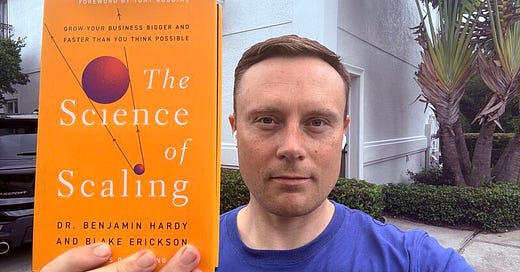A Few Business Quotes That Apply to Coaches
Say No to Almost Everything: Business Lessons That Will Transform Your Craft
NOTE: In the spirit of patriotism, I decided to extend the 33% off HC Summer Sale on Gumroad through the end of the holiday weekend. You now have until midnight on the 6th to snag 33% off the entire store AND/OR HC Extra for $35 a year instead of $50.
Just use code HCSUMMER in the Gumroad store to grab your discount.
I recently stumbled on a business article by Benjamin Hardy and thought a lot of the content in the article could directly be applied to coaches, trainers, players, leaders, etc.
The article basically covered what separates truly elite performers from everyone else.
It’s built around this idea:
Most people are optimizing things that shouldn’t even exist.
Even though these ideas come from the world of startups, founders, CEOs, and business owners…the principles apply to basketball and leadership - whether you’re a coach, trainer, or a player.
Here are a few thoughts from the article (read the whole thing here):
1. Say No to Almost Everything
“The difference between successful people and really successful people is that really successful people say no to almost everything.” – Warren Buffett
There’s a lot of noise surrounding you - whatever it is that you’re doing. The internet has become an unlimited resource and gives everyone equal opportunity to be a master of any type of content. The access to knowledge is limitless.
This is good (lots of stuff) and bad (too much stuff).
Hell, I sell a playbook of over 650+ plays - that’s obviously more than you’d ever run.
But the highly effective leader is able to take a look at everything available, filter it, see what fits/is most effective for them, and forgets the rest.
They can say NO to almost everything else besides what leads to actual winning.
If you’re not saying no to 90% of the noise, you’re not focused.
Real success comes from subtraction, not addition.
2. Are You Optimizing What Shouldn’t Exist?
“The most common mistake of a smart engineer is to optimize a thing which should not exist.” – Elon Musk
Are you running plays your players can’t actually execute when it matters?
Building workouts that don’t translate into game success?
Chasing stats that aren’t conducive to winning as a player?
We spend so much time working on things that we shouldn’t even be paying attention to.
Be ruthless about what you focus on - and what you ignore.
3. Strategy Is About What You Don’t Do
Dr. Richard Rumelt, in Good Strategy/Bad Strategy, said:
“Strategy is at least as much about what an organization does not do as it is about what it does.”
Seeing a theme here?
Try making a “Not To Do List” or “Things We Don’t Do List”
What drills do we not run? What behaviors do we not allow? What protocols and procedures do we avoid? What do we not do on offense? What workouts are more for look than substance?
Good strategy is rare in basketball because it’s uncomfortable. It forces you to choose one path—and shut the door on all the others.
4. Set Your Posteriorities
Peter Drucker added a brilliant idea:
“The reason why so few executives concentrate is the difficulty of setting 'posteriorities'—that is, deciding what tasks not to tackle—and sticking to the decision.”
It’s easy to make a to-do list. It’s much harder to commit to a “don’t do” list.
Every coach, trainer, and player should be asking:
What am I cutting this season?
What am I refusing to waste energy on?
What distractions need to die?
What needs pruning in my program?
What needs to die so my program/team/coaching/leadership can thrive?
Focus isn’t about doing more. It’s about doing less, better.
Be an essentialist.
5. FRAME. FLOOR. FOCUS.
The original article introduces a strategy model from Scaling.com called the Scaling Framework: Frame. Floor. Focus.
Here’s how it breaks down:
Frame – What’s your vision? What game are you playing?
Floor – What’s your minimum standard? What will you not tolerate? Don’t worry about your CEILING (or the maximum best thing) - worry about the very lowest you’ll tolerate or allow.
Focus – What are you actually doing, every day, to execute?
6. Pros Have a Higher Floor
The article says:
“The difference between pros and amateurs isn’t their ceiling—it’s their floor.”
There’s a difference between going through the motions and being great. In whatever endeavor you choose, only a few refuse to dip below a certain standard. That’s all the difference over time. But only a few refuse to dip below a certain standard.
Pros don’t skip (or have bad) workouts, practices, drills, film sessions, etc.
Pros don’t let emotions derail their plan.
Pros don’t try everything—they master one thing.
Want to be elite? Raise your floor. Raise your bare minimum that’s acceptable.
7. Nothing Fails Like Success
One of the boldest statements in the article is this:
“Nothing fails like success.”
Why? Because most people settle once they start winning. They stop raising their standards. They stop searching for better strategy.
They believe what led them to victory last season will do the same thing next season.
You’ll be tested at every level. When things start going well, that’s when most stop growing.
Final Takeaway: Good Strategy is Rare
If you want to read the full business article that inspired this post, you can check it out HERE. But the message is clear:
Success doesn’t come from doing more. It comes from focusing more.
As a coach, trainer, or player—take the summer and use it as a season of subtraction.
Say no to almost everything… so you can say yes to getting better.
Keep the faith and see you next week!




